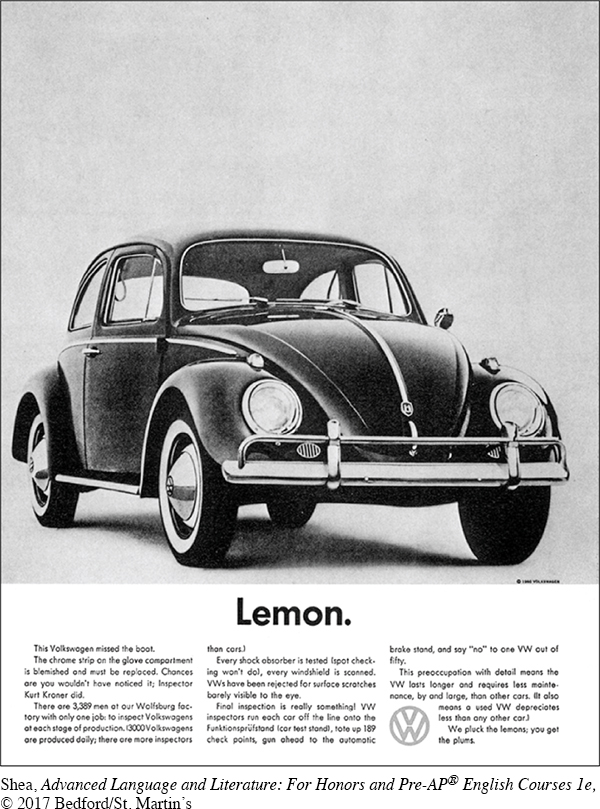Effect of Irony
When you’re analyzing the effect or impact that irony has as a literary device or rhetorical strategy, it’s important to think about how the irony connects to bigger ideas—to the meaning of the passage, or a theme of the work as a whole.
Page 843
Irony is a favorite strategy of advertising because it can bring a smile to our face because of some clever humor, or it can jolt us into taking a second look. What happens in this Volkswagen car ad when you see a picture of the VW “Bug” with the word “Lemon” as what seems to be the caption? What’s going on? Why would the VW corporation advertise this car as a “lemon,” the common expression for something that’s undesirable? As you read the fine print, you’re told how meticulous the VW inspection team is, attending to every detail of safety and efficiency. If there are any problems, then the car doesn’t leave the factory—that is, no lemons for sale, only (as the last line emphasizes) “plums.” The VW advertisers use irony both to pique interest and to emphasize their product’s quality. Calling what seems to be a perfectly fine VW a “lemon” implies the reality of such high standards that you can be sure you’ll never drive off the lot with a lemon from VW.
Now let’s turn to a written text to see how irony contributes to the meaning of the work as a whole. In Cyrano de Bergerac, the playwright Rostand uses irony not just as a verbal stylistic tool but also as a structural tool: the discrepancy between appearance and reality is one of the primary themes that he develops through both the language and the action of the play. Think about it: Christian’s handsome appearance—ironically—attracts Roxane, who purports to want a relationship that is more spiritual, more of a relationship between kindred spirits. Then—ironically—she confesses her “love” for Christian to Cyrano. Cyrano is complicit in the deception that Christian is the eloquent suitor, creating the stirring and romantic speeches that—ironically—draw Roxane to Christian. The irony deepens when Christian, determined to tell Roxane the truth, is killed before he can make this revelation to his beloved. Thus—ironically—his untimely death sends her into the convent to spend her life grieving for a lost love who, in the person of Cyrano, is, in fact, still alive and very much in love with her!
Not just through the language, but through the structure of the plot, Rostand reminds us of the discrepancy between inner beauty—the powerful and heartfelt language of Cyrano, the man with the nose so large as to seem a deformity—and outer beauty—the handsome Christian. The ironies also underscore Roxane’s inability to see beyond the pretty face, as it were, to the devoted soul.
Ultimately, through these ironic situations, Rostand leaves his audience thinking about a theme of the play—how our vanity or superficial thinking can lead us to confuse what we see and what actually is; in other words, the theme is the danger of mistaking what seems to be true for the truth.
